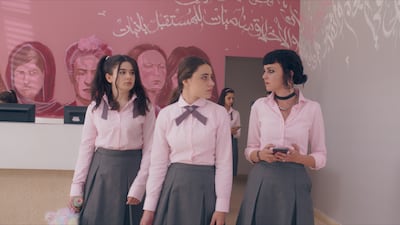Netflix has announced a second season of AlRawabi School for Girls.
The Arabic Original became a regional hit when it was released on the streaming platform in August 2021. The series is set in a fictional girls' school and traces the oscillating highs and lows of adolescence. Its honest portrayal of contemporary issues, from bullying to social alienation, doesn’t linger on the perspective of one character for too long, instead offering a kaleidoscopic vision of the experiences unfolding at the upscale school.
Netflix creatively announced the show's renewal with a letter issued by the AlRawabi School for Girls Administration to its student body ahead of the school year. It has yet to set a release date.
“We look forward to welcoming you back to AlRawabi School for Girls,” the letter reads. “When we return, we promise a fresh and exciting perspective, and urge you to bring renewed energy to the year ahead.”
A video was also posted showing aerial shots of a yellow school bus heading towards campus, which ends as the vehicle drives through the gates.
Tima Shomali and Shirin Kamal will return to the series as creators and executive producers, in collaboration with writer and executive producer Islam Alshomali. Shomali will also reprise her role as the show’s director.
“I wanted to do a project that talks about women’s stories from the perspective of women for a long while. And I wanted to do it with a team of women,” Shomali told The National in an interview following the show’s release.
“So, as we started writing a high-school drama, it became obvious that this was the project I was waiting for.
“One of the great things that Tima and Shirin did in the show was break the mould of the two-dimensional female character,” Ahmed Sharkawi, director of Arabic Original Series at Netflix, said in an interview with The National last year. “None of the characters are fully evil, nor are they fully good. So this kind of shifting perception is very enriching.”
Sharkawi said the streaming service was aware that some who watch the show might be going through experiences similar to its characters. That is why each episode ends by directing viewers to an online bullying information resource, wannatalkaboutit.com.
“It’s a Netflix site that provides mental health resources for topics such as bullying,” he says. “We know the show touches on some sensitive subjects, but we welcome that because it creates some kind of dialogue.”
The five pillars of Islam
Vaccine Progress in the Middle East
Tips to stay safe during hot weather
- Stay hydrated: Drink plenty of fluids, especially water. Avoid alcohol and caffeine, which can increase dehydration.
- Seek cool environments: Use air conditioning, fans, or visit community spaces with climate control.
- Limit outdoor activities: Avoid strenuous activity during peak heat. If outside, seek shade and wear a wide-brimmed hat.
- Dress appropriately: Wear lightweight, loose and light-coloured clothing to facilitate heat loss.
- Check on vulnerable people: Regularly check in on elderly neighbours, young children and those with health conditions.
- Home adaptations: Use blinds or curtains to block sunlight, avoid using ovens or stoves, and ventilate living spaces during cooler hours.
- Recognise heat illness: Learn the signs of heat exhaustion and heat stroke (dizziness, confusion, rapid pulse, nausea), and seek medical attention if symptoms occur.
Conflict, drought, famine
Estimates of the number of deaths caused by the famine range from 400,000 to 1 million, according to a document prepared for the UK House of Lords in 2024.
It has been claimed that the policies of the Ethiopian government, which took control after deposing Emperor Haile Selassie in a military-led revolution in 1974, contributed to the scale of the famine.
Dr Miriam Bradley, senior lecturer in humanitarian studies at the University of Manchester, has argued that, by the early 1980s, “several government policies combined to cause, rather than prevent, a famine which lasted from 1983 to 1985. Mengistu’s government imposed Stalinist-model agricultural policies involving forced collectivisation and villagisation [relocation of communities into planned villages].
The West became aware of the catastrophe through a series of BBC News reports by journalist Michael Buerk in October 1984 describing a “biblical famine” and containing graphic images of thousands of people, including children, facing starvation.
Band Aid
Bob Geldof, singer with the Irish rock group The Boomtown Rats, formed Band Aid in response to the horrific images shown in the news broadcasts.
With Midge Ure of the band Ultravox, he wrote the hit charity single Do They Know it’s Christmas in December 1984, featuring a string of high-profile musicians.
Following the single’s success, the idea to stage a rock concert evolved.
Live Aid was a series of simultaneous concerts that took place at Wembley Stadium in London, John F Kennedy Stadium in Philadelphia, the US, and at various other venues across the world.
The combined event was broadcast to an estimated worldwide audience of 1.5 billion.
Queen
Nicki Minaj
(Young Money/Cash Money)
Sanju
Produced: Vidhu Vinod Chopra, Rajkumar Hirani
Director: Rajkumar Hirani
Cast: Ranbir Kapoor, Vicky Kaushal, Paresh Rawal, Anushka Sharma, Manish’s Koirala, Dia Mirza, Sonam Kapoor, Jim Sarbh, Boman Irani
Rating: 3.5 stars


